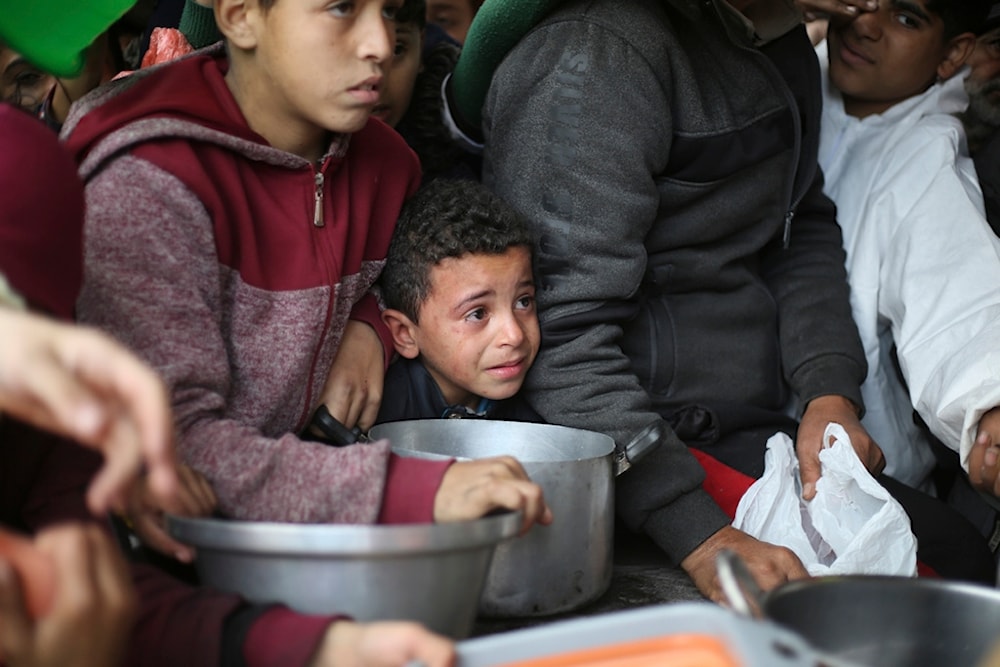Nearly 17,000 children in Gaza left unaccompanied or separated: UNICEF
Oftentimes, due to the extreme state of shock or injury, children are unable to provide their names, UNICEF spokesman Jonathan Crickx said.
-

Palestinians line up for free food distribution during the ongoing Israeli air and ground offensive in Khan Younis, Gaza Strip, Friday, Feb. 2, 2024 (AP Photo/Hatem Ali)
As of Friday, the United Nations reported an estimate indicating that approximately 17,000 children in the Gaza Strip have been left without parental care or separated, a situation persisting nearly four months into the war.
"Each one has a heartbreaking story of loss and grief," Jonathan Crickx, spokesman for the UN children's agency UNICEF in the occupied Palestinian territories, told a media briefing in Geneva via video-link. "This figure corresponds to one percent of the overall displaced population -- 1.7 million people."
Each one "is a child who is coming to terms with a horrible new reality".
Crickx mentioned that identifying the children poses significant challenges, given that they are often brought to hospitals in a state of injury or shock, making it "extremely difficult" to ascertain their identities. In some cases, the children are unable to provide even their names.
Stories of loss and grief: At least 17,000 children are estimated to be unaccompanied or separated from their parents in the #Gaza Strip
— UNICEF MENA - يونيسف الشرق الأوسط وشمال إفريقيا (@UNICEFmena) February 2, 2024
UNICEF State of Palestine Chief of Communication Jonathan Crickx at today's press briefing
Read the full briefing: https://t.co/O6TH9omdUW pic.twitter.com/InYtUHbjI5
He noted that in times of war, it is customary for extended families to assume responsibility for caring for children who have lost their parents.
However, "due to the sheer lack of food, water or shelter, extended families are themselves distressed and face challenges to immediately take care of another child as they themselves are struggling to cater for their own children and family", said Crickx.
In a broader sense, UNICEF categorizes separated children as those who are without their parents, while unaccompanied children are defined as those who are not only separated but also lack the presence of other relatives.
Read more: IOF turned Gaza into children's biggest graveyard: Euro-Med Monitor
Elsewhere in his comments, Crickx expressed that the ongoing war was significantly impacting the mental health of children in Gaza.
"They present symptoms like extremely high levels of persistent anxiety, loss of appetite, they can’t sleep, they have emotional outbursts or panic every time they hear the bombings," he explained.
Prior to the outbreak of the war, UNICEF had projected that over 500,000 children in the Gaza Strip required mental health and psycho-social support.
UNICEF now holds the belief that "almost all children are in need" of mental health and psycho-social support, surpassing the initial estimate to now encompass more than one million children.
"Children don't have anything to do with this conflict. Yet they are suffering like no child should ever suffer," said Crickx. "No child should ever be exposed to the level of violence seen on October 7 -- or to the level of violence that we have witnessed since then."
He urged for a ceasefire to enable UNICEF to conduct a thorough assessment of unaccompanied or separated children, trace their relatives, and provide essential mental health support.
Read more: 'Israel' murdered 11,000 children in Gaza in 108 days

 3 Min Read
3 Min Read








